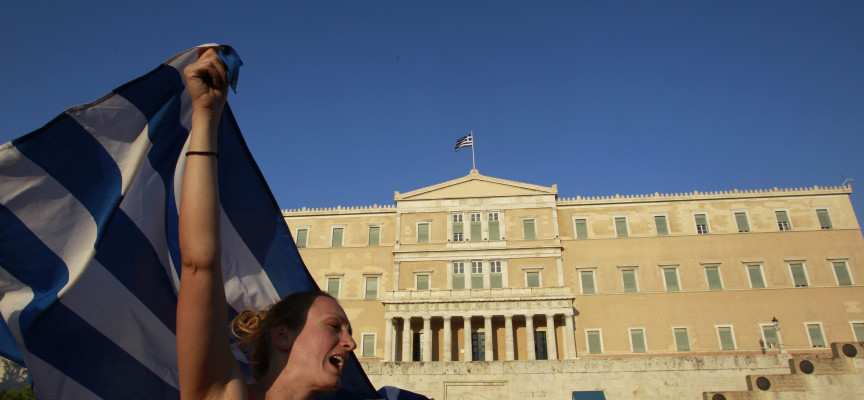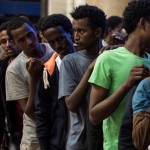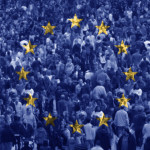Long days and nights of nerve-wrecking negotiations lie behind us. The Greek crisis of recent weeks has preoccupied not only our political leaders but also each and every European citizen, living with the uncertainty as to whether or not the crisis would end with a positive outcome. I would like to express my gratitude to all who have committed themselves to pursuing the European integration project. Despite the unfavourable portents, all parties involved – the officials of the European institutions, the heads of state and government in the Eurozone and the Finance ministers – have not abandoned the pursuit of a common European solution. It deserves to be recognised that this successful outcome is the work of specific individuals whose personal commitment merits acknowledgement.
The negotiations were tough, really tough. The stakes were very high for all those involved. There were grounds enough for engaging in a blame game. What is more important, however, is that we now look forward and think together about a common solution. The work ahead is daunting and can only be undertaken by Greece with the support of its European partners. The vast majority of Greeks want to stay in the EU and in the Eurozone. Moreover, the other member states too want to keep Greece in the EU. That the solution represents a classic European compromise is evidenced by the fact that in all EU countries the agreement was both welcomed and contested. All have a vested interest in an improvement in Greece’s economic circumstances and that the common European endeavour move ahead. It is thus essential that all Europeans concentrate on the common tasks and goals ; it is vital that they work on achieving them together.
The most urgent task is the restoration of the trust lost in recent months. In order for any further steps to be taken not only towards achieving economic and financial consolidation, but also for co-operation within Europe on other policy matters, states and governments must be able to trust one another. The classic prejudices and clichés which characterise discourse between European peoples, heightened as they have been by the overheated atmosphere of recent months, must be deconstructed and overcome. It is essential that all parties take steps to restore confidence and re-create a calmer climate in Europe, exploring a more constructive, common approach into the future.
The Church has always followed the process of European unification with benevolent interest. With this in mind, I would like to express how happy I am that a European solution was reached by the heads of state and government and that neither the wider EU nor the Eurozone risks collapse. And yet numerous questions remain. Is the package of solutions proposed viable? Can Greece stand on its own two feet again after meeting the requirements imposed? How do we keep the needs of the poor and the dis-advantaged within our sights? I would like to encourage all European citizens to commit themselves to achieving success as a common enterprise. There are enormous challenges requiring a long-term strategy, and they can be met only by courageous and creative solutions. Up until now no serious attempt has been made to tackle the structural causes of the crisis. It has to be said, there is even more to be done: reduction of unemployment among the young, a common concern for refugees, the pursuit of peace in Europe (e.g. in Ukraine) and in our immediate neighbourhood (e.g. Near- and Middle-East).
It is vital that we learn lessons from the events of recent weeks and that we draw conclusions from the crisis. The EU alone cannot tackle the wide range of issues which fall within the responsibilities of the heads of state and government. The EU member states have got to do more work on the bases of our economic and monetary union, while Europe needs a stronger political co-ordination in the areas of economic, financial and social policy. A new approach to economic and financial co-operation in the EU is essential to any return to a success free of the perpetually returning threat of a currency crisis or social conflict.
The project of European integration and unity has brought its peoples peace, security and prosperity. These successes need to be protected and to be shared by all. Europe is a project of reconciliation, not of division. What is now required is that all Europeans come together so that we can carry this European project forward hand in hand.’ It is more than just a question of the Euro. It is a matter of re-kindling the European idea by setting new goals, by fresh commitment. The targets set at the moment the European Union was founded are far from being met. As Christians we commit ourselves to co-operating in making this project a reality, and we do so with profound conviction.
Viele Tage und vor allem Nächte mit nervenaufreibenden Verhandlungen liegen hinter uns. Die Griechenlandkrise hat in den letzten Wochen nicht nur die Politik, sondern alle Europäer beschäftigt, ohne zu wissen, ob es am Ende zu einer positiven Lösung kommen wird. Ich danke allen, die sich für einen Erfolg für das europäische Einigungsprojekt engagiert haben. Trotz aller Widrigkeiten haben sich die Verantwortlichen – die Vertreter der Europäischen Institutionen, die Staats- und Regierungschefs der Eurozone und die Finanzminister – nicht davon abbringen lassen, für eine gemeinsame europäische Lösung zu streiten. Deshalb gilt ihnen ein besonderer Dank, denn letzten Endes sind es immer konkrete Personen, die sich auch persönlich für eine solche Lösung aufreiben.
Die Verhandlungen waren hart, sehr hart. Aber es stand für alle Beteiligten auch sehr viel auf dem Spiel. Sicherlich gäbe es mehr als genug Grund, nach den Schuldigen für die verfahrene Situation zu fragen. Aber noch viel wichtiger ist es jetzt, nach vorne zu blicken und sich wieder auf das Gemeinsame zu besinnen. Denn die Arbeiten, die jetzt zu erledigen sind, sind immens und können auch von Griechenland nur mit der Unterstützung der europäischen Partner geleistet werden. Das griechische Volk will mehrheitlich in der Europäischen Union und der Eurozone bleiben. Ebenso wollen auch die anderen Mitgliedstaaten Griechenland in der Gemeinschaft behalten. Dass es in allen europäischen Ländern sowohl Zustimmung als auch Widerstände zur Einigung vom Montagmorgen gibt, zeigt, dass die Lösung ein klassischer europäischer Kompromiss ist. Alle haben ein Interesse daran, dass es mit Griechenland rasch wirtschaftlich aufwärts geht und dass die europäische Einigung voranschreitet. Deshalb müssen sich jetzt alle Europäer auf die gemeinsamen Aufgaben und Ziele konzentrieren und gemeinsam daran arbeiten.
Eine wichtige Voraussetzung dafür ist es, verlorengegangenes Vertrauen wiederherzustellen. Für die weiteren Schritte der wirtschaftlichen und finanziellen Konsolidierung, aber auch für die europäische Zusammenarbeit in anderen Fragen, müssen sich die Staaten und Regierungen gegenseitig vertrauen. Auch Vorurteile und Klischees zwischen den Völkern, die sich in der aufgeheizten Stimmung eher noch verstärkt haben, müssen abgebaut und überwunden werden. Deshalb sind von allen Seiten vertrauensbildende Maßnahmen erforderlich, um das Klima in Europa wieder zu beruhigen und einen konstruktiven gemeinsamen Weg in die Zukunft zu finden.
Die Kirche hat die Europäische Einigung stets mit Wohlwollen begleitet. Insofern begrüße ich nachdrücklich, dass es zwischen den Staats- und Regierungschefs zu einer europäischen Lösung gekommen ist und dass Europa und die Eurozone nicht auseinanderfallen. Es müssen jedoch noch zahlreiche Fragen beantwortet werden: Ist das jetzt gefundene Paket auch tragfähig? Kommt Griechenland mit den vereinbarten Maßnahmen wieder auf die Beine? Wie bleiben die Armen und Schwachen im Blick? Ich ermutige alle Europäer, sich für den gemeinsamen Erfolg weiter zu engagieren. Für die großen und langfristigen Herausforderungen bedarf es mutige und kreative Lösungen. Denn bislang ist die Beseitigung der strukturellen Ursachen für die Krise noch nicht hinreichend in Angriff genommen worden. Und vieles andere bleibt zu tun: die Bekämpfung der Jugendarbeitslosigkeit, die gemeinsame Sorge um die Flüchtlinge, der Einsatz für den Frieden in Europa (z.B. der Ukraine) und in seiner Nachbarschaft (z.B. der Nahe und Mittlere Osten).
Deshalb ist es erforderlich, aus den Geschehnissen der vergangenen Wochen zu lernen und Konsequenzen aus der Krise zu ziehen. Allzu viele Nachtschichten der Staats- und Regierungschefs mit dieser Dramatik kann sich die Europäische Union kaum leisten. Die Mitgliedstaaten der EU müssen an den Grundlagen der Wirtschafts- und Währungsunion arbeiten, denn Europa braucht eine stärkere politische Koordination in der Wirtschafts-, Währungs- und Sozialpolitik. Damit die EU langfristig wieder auf einem guten gemeinsamen Weg in die Zukunft gehen kann und es nicht immer wieder zu Währungskrisen und sozialen Verwerfungen kommt, ist eine Reform der wirtschafts- und währungspolitischen Zusammenarbeit in der EU erforderlich.
Die Europäische Einigung hat den europäischen Völkern Frieden, Sicherheit und Wohlstand gebracht. Diese Erfolge müssen gesichert und für alle zugänglich werden. Europa ist ein Projekt der Versöhnung, nicht der Spaltung. Deshalb müssen nun alle Europäer aufeinander zugehen, damit wir Europa gemeinsam weiter voranbringen. Es geht um mehr als den Euro. Es geht um eine wirkliche Erneuerung der europäischen Idee mit neuen Zielen, neuem Engagement. Die Aufgaben der Gründungszeit der Europäischen Union sind noch lange nicht erledigt. Als Christen werden wir an diesem Projekt aus Überzeugung weiter mitarbeiten.
“Un progetto di riconciliazione, non di divisione”
Giorni e soprattutto notti di negoziazioni sono alle nostre spalle. La crisi in Grecia ha, nel corso delle ultime settimane, occupato a tempo pieno non solo il mondo politico ma anche tutti gli europei, e questo senza la sicurezza di un risultato positivo. Ringrazio tutti quelli che si sono impegnati perché le negoziazioni portassero a un successo per il Progetto europeo. Contro ogni attesa, i responsabili – i rappresentanti delle istituzioni europee, i capi di Stato e di Governo della zona euro e i ministri delle finanze – non hanno cessato di battersi per una soluzione europea comune. Questi ringraziamenti li rivolgo innanzi tutto alle donne e agli uomini di cui, in fin dei conti, è l’implicazione personale che ha portato a una soluzione.
I negoziati sono stati difficili, molto difficili, all’altezza della posta in gioco di tutte le parti interessate. Certamente potremmo cercare i responsabili di questa difficile situazione, ma è molto più importante continuare ad avanzare nello spirito di comunità. Il lavoro da svolgere è oggi immenso e la Grecia potrà uscirne solo con l’aiuto dei suoi partner europei. La maggior parte del popolo greco vuole restare nell’unione europea e nella zona euro. Così come gli Stati membri vogliono che la Grecia resti nell’Unione. La divergenza di opinioni tra i Paesi europei riguardo l’accordo di lunedì, dimostra che la soluzione è un compromesso europeo standard. È nell’interesse di ciascuno che la Grecia ritrovi rapidamente la crescita economica e che l’integrazione europea s’intensifichi. È dunque essenziale che tutti gli europei si concentrino su loro obblighi e obiettivi comuni e che si aprano insieme alla loro realizzazione.
Per riuscirci, bisogna innanzi tutto ripristinare la fiducia che è stata perduta. Il consolidamento economico e finanziario, così come la collaborazione a livello europeo in altri ambiti, non può progredire senza una fiducia reciproca degli Stati e dei Governi. Bisognerà inoltre liberarsi da pregiudizi e stereotipi tra i popoli che sono stati alimentati dall’atmosfera tesa di queste ultime settimane. Dovranno tutti prendere delle misure che mirino a ristabilire la fiducia se si vuole distendere il clima in Europa e avanzare insieme verso il futuro in maniera costruttiva.
La Chiesa ha sempre sostenuto il progetto d’integrazione europeo. Sono quindi veramente contento che una soluzione europea sia stata trovata dai capi di Stato e di Governo e che l’Europa e la zona euro non svanisca. Tuttavia molte domande meritano di essere poste: il pacchetto di misure trovato è valido? Queste misure permetteranno alla Grecia di rialzarsi? Che ne è dei poveri e dei più deboli? Invito tutti gli europei a continuare a impegnarsi per un successo comune. Delle sfide altrettanto grandi e a lungo termine necessitano di soluzioni coraggiose e creative. Fino ad ora l’estirpazione delle cause strutturali della crisi non è stata sufficientemente affrontata. Eppure resta molto da fare: la lotta contro la disoccupazione dei giovani, la comune preoccupazione per i rifugiati, l’impegno per la pace in Europa (per esempio in Ucraina) e nei Paesi vicini (per esempio in Vicino e Medio Oriente).
È dunque necessario trarre degli insegnamenti dagli eventi di queste ultime settimane e tirare le conclusioni della crisi. L’Unione europea non può permettersi che i suoi governatori passino delle notti a riparare a dei drammi. Gli Stati membri dell’Ue devono lavorare sui fondamenti dell’unione economica e monetaria, perché l’Europa ha bisogno di una maggiore coordinazione politica sulle questioni economiche, monetarie e sociali. Se l’Ue vuole avanzare ancora verso il futuro con passo comune ed evitare a lungo termine le crisi monetarie e le instabilità sociali ricorrenti, deve imperativamente ripensare la cooperazione economica e monetaria europea.
L’integrazione europea ha portato la pace, la sicurezza e la prosperità agli europei. Questi risultati devono essere accessibili a tutti. L’Europa è un progetto di riconciliazione, non di divisione. Tutti gli europei devono da ora lavorare mano nella mano per far progredire il progetto europeo. Questo va al di là dell’euro. Si tratta di ripensare completamente l’ideale europeo, dotato di nuovi obiettivi e di un nuovo impegno. I compiti del periodo fondatore dell’Unione europea sono lungi dall’essere terminati. In quanto cristiani siamo pronti a continuare a sostenere questo progetto con convinzione.
“Un projet de reconciliation, pas de division”
Des jours et surtout des nuits de négociations intenses sont derrière nous. La crise en Grèce a, au cours des dernières semaines, occupé à plein temps non seulement le monde politique, mais aussi tous les Européens et ce, sans l’assurance d’une issue positive. Je remercie tous ceux qui se sont engagés pour que ces négociations aboutissent à une réussite pour le Projet européen. Contre toute attente, les responsables – les représentants des Institutions européennes, les Chefs d’Etat et de Gouvernement de la zone euro et les Ministres des Finances – ne se sont pas laissés dissuader de se battre pour une solution européenne commune. Ces remerciements je les adresse avant tout aux femmes et aux hommes dont, au bout du compte, c’est l’implication personnelle qui a mené à une solution.
Les négociations furent difficiles, très difficiles, à la hauteur des enjeux pour toutes les parties prenantes. Bien sûr nous pourrions chercher les responsables de cette situation difficile, mais il est bien plus important d’aller de l’avant dans un esprit de communauté. Le travail à accomplir est aujourd’hui immense et la Grèce ne pourra s’en sortir qu’avec l’aide de ses partenaires européens. Le peuple grec dans sa grande majorité souhaite rester dans l’Union européenne et dans la zone euro. Tout comme les Etats membres veulent que la Grèce reste dans l’Union. La divergence des opinions au sein des pays européens par rapport à l’accord de lundi, montre que la solution est un compromis européen standard. Il est de l’intérêt de chacun que la Grèce retrouve rapidement la croissance économique et que l’intégration européenne s’intensifie. Il est donc essentiel que tous les Européens se concentrent sur leurs tâches et objectifs communs et qu’ils oeuvrent ensemble à leur réalisation.
Pour réussir, il faut avant tout restaurer la confiance qui a été perdue. La consolidation économique et financière, tout comme la collaboration au niveau européen dans d’autres domaines, ne peut progresser sans une confiance mutuelle des Etats et Gouvernements. De même faudra-t-il s’affranchir des préjugés et stéréotypes entre les peuples qui ont été nourris par l’atmosphère tendue de ces dernières semaines. Tous devront prendre des mesures visant à rétablir la confiance si l’on veut apaiser le climat en Europe et avancer ensemble vers l’avenir de manière constructive.
L’Eglise a toujours soutenu le projet d’intégration européen. Je me réjouis donc véritablement qu’une solution européenne ait été trouvée par les Chefs d’Etat et de Gouvernement et que l’Europe et la zone euro ne s’étiolent pas. De nombreuses questions méritent cependant d’être posées : Le paquet de mesures trouvé est-il viable ? Ces mesures permettront-elles à la Grèce de se relever ? Qu’en est-il des pauvres et des faibles ? J’encourage tous les Européens à continuer à s’engager pour un succès commun. Des défis aussi grands et à aussi long terme nécessitent des solutions courageuses et créatives. Jusqu’à présent l’éradication des causes structurelles de la crise n’a pas été suffisamment abordée. Il reste pourtant beaucoup à faire : la lutte contre le chômage des jeunes, la préoccupation commune pour les réfugiés, l’engagement pour la paix en Europe (par ex. en Ukraine) et dans son voisinage (par ex. au Proche et Moyen Orient).
Il est donc nécessaire de tirer les leçons des événements de ces dernières semaines et de tirer des conclusions de la crise. L’Union européenne ne peut se permettre que ses dirigeants passent des nuits à régler des drames. Les Etats membres de l’UE doivent travailler sur les fondements de l’Union économique et monétaire, parce que l’Europe a besoin d’une plus grande coordination politique sur les questions économiques, monétaires et sociales. Si l’UE veut avancer à nouveau vers l’avenir d’un même pas et éviter à long terme les crises monétaires et les instabilités sociales récurrentes, elle doit impérativement repenser la coopération économique et monétaire européenne.
L’intégration européenne a apporté la paix, la sécurité et la prospérité aux Européens. Ces aboutissements doivent être accessibles à tous. L’Europe est un projet de réconciliation, pas de division. Tous les Européens doivent à présent travailler main dans la main pour faire progresser le Projet européen. Cela va au-delà de l’euro. Il s’agit de repenser entièrement l’idéal européen, doté de nouveaux objectifs et d’un nouvel engagement. Les tâches de la période fondatrice de l’Union européenne sont loin d’être terminées. En tant que Chrétiens, nous sommes prêts à continuer à soutenir ce projet avec conviction.
Card. Reinhard Marx
Latest posts by Card. Reinhard Marx (see all)
- “A project of reconciliation, not of division” - 19 luglio 2015











